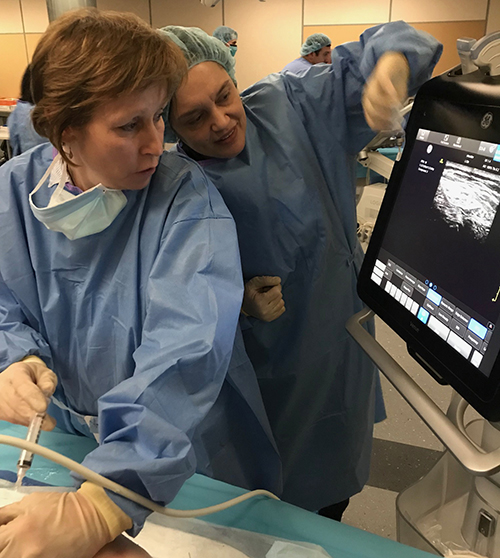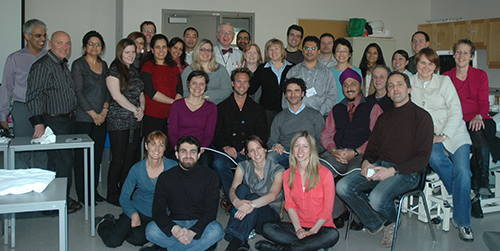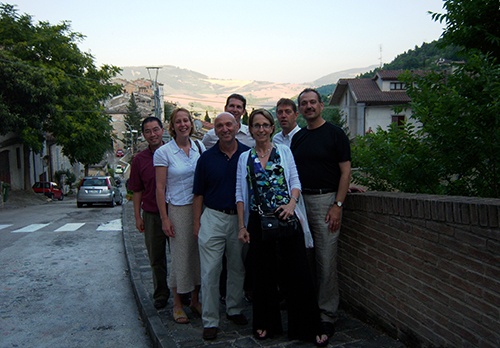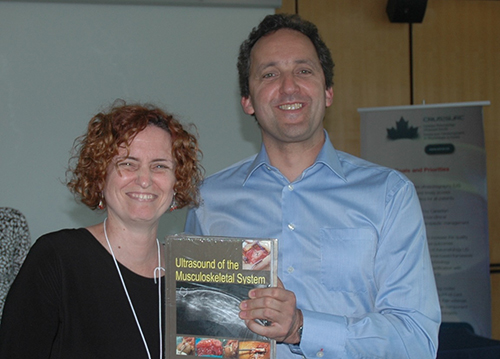Summer 2019 (Volume 29, Number 2)
CRUS: Expanding The Scope of Practice
A Long Road Less Travelled
By Abraham Chaiton, MD, MSc, FRCPC, RhMSUS; Maggie Larché, MBChB, MRCP(UK), PhD; Johannes Roth, MD, PhD, FRCPC, RhMSUS; and Michael Stein, MD, FRCPC
Download PDF
The Italian Job – The Early Years
In 2009, a group of Canadian rheumatologists who expressed an interest in exploring the role that ultrasonography could play in their practice and research found themselves in a small town in Italy near the Adriatic coastline, hosted by a group of enthusiastic and passionate Italian rheumatology sonographers. Two groups of 10-12 novice clinicians spent a week each in Jesi, Italy, at the invitation of Drs. Walter Grassi and Emilio Filippucci.
A core of converted believers set out to form a not-for-profit Canadian Society whose mandate was to foster the use of ultrasonography in teaching, education and research in rheumatology.
CRUS and Its Mandate – The Growing Pains
With the assistance of industry in providing unrestricted educational grants, the Canadian Rheumatology Ultrasound Society (CRUS) was born one year later in 2010.
Soon after, a training model was developed consisting initially of a basic course with a faculty representing a mix of Canadian and international expert tutors. The Canadian program was unique in providing several weekends of instruction, integrated anatomy and a year-long provision of electronically supervised scanning feedback. The program was centred at McMaster University.
Progression to the intermediate level courses pre- and post-CRA annual meetings soon followed, as graduates of the basic program demanded more advanced training.
Our core instructors and recent graduates began to participate in research projects that included ultrasound evaluations.
Speaker tours by renowned musculoskeletal (MSK) sonographers were organized in many Canadian centres as a yearly event.
Some highlights included the CRA Great Debate 2012: “Should Ultrasound (US) Be Used in the Rheumatologist's Office?” Debating in favor of this were Drs. Larché and Roth, and debating against were Drs. Penney and Collins. It has to be mentioned that all four are actually avid users of ultrasonography in their offices.
Other activities included ultrasound training that was embedded into fellowship trainings at several Canadian universities.
Finally, off-shore teaching requests in Saudi Arabia and Kuwait for CRUS-structured programs validated the high standards and quality of our Canadian ultrasound training program.
The Ultrasound Frequency is Gaining Depth – A Brief Timeline of Events
- 2014-15: The Adoption of US teaching into the rheumatology core curriculum at several universities.
- 2016: Research prizes were awarded by CRUS for research projects that employed point-of-care ultrasound as a component. Yearly competitive awards are continued by the CRUS research committee.
- 2017: CRUS promotes the value of vascular ultrasound of the temporal vessels in GCA after a Canadian contingent returns from an intensive hands-on teaching program sponsored by Dr. Andreas Diamantopoulos in Kristiansand, Norway.
- 2018: US Intervention Courses adopted as a post-CRA event in Ottawa, Vancouver and Montreal Simulation Centres.
The End of The Beginning – Focus is at The Royal College
From the beginning, there was debate as to the role of CRUS in the certification of competency of its trainees. Should we adopt the examination format currently in place from the American College of Rheumatology (ACR) and the European League Against Rheumatism (EULAR), or enlist an arms-length approach by recruiting the services of the Royal College of Canada?
The Royal College was in the process of granting diplomas in specialized fields of practice that did not warrant the formation of a new specialty(www.
royalcollege.ca/rcsite/specialty-discipline-recognition
/categories/discipline-recognition-areas-focused-competence-
afc-programs-e). We thought that this approach would be ideal, unique and would provide a much-needed validation that point-of-care ultrasound would be recognized within the scope of rheumatology practice. Candidates who complete the added training requirements and acquire the complementary skills and competencies would receive the added qualification of diplomate of the Royal College of Physicians and Surgeons of Canada (DRCPSC). This decision was to engage our patience in a process that is now over six years long.
The 6th Year of a Project in Progress at the Royal College of Canada
NMSKUS AFC Diploma in Canada
- In 2013, rheumatology considers an application for an MSK POCUS AFC Diploma, and is advised by the Committee on Specialties (COS) to partner with Emergency Medicine as they were applying for a similar AFC Diploma at the same time.
- Joint Application is submitted, after receiving support from Dr. Grant Stoneham, Chair of the Specialty Committee of Diagnostic Radiology. Application was rejected by the COS for a lack of common shared skills; disciplines are too disparate to be considered together.
- Consequences: A second application attempt is required, and, if rejected, a five-year waiting period (penalty) is required before any further applications can be received.
- Emergency Medicine proceeds and applies as an Acute Care POCUS (and is successful in 2018).
- Rheumatology considers re-applying as Ambulatory Care POCUS
- Rheumatology is advised to partner with other medical/surgical disciplines, and not go it alone, as the Royal College would not approve an ultrasound-related AFC for each subspecialty.
- Further delays are required to contact all disciplines and request their participation or letters of support (i.e. internal medicine, pediatrics, orthopedics, sports & exercise medicine, pain medicine, anaesthesiology, family practice). All support our application. Only physiatry and neurology agree to be active participants.
- Rheumatology and associated disciplines do not accept the suggested proposal to submit their application as Ambulatory Care POCUS. Rather, they amend the application to reflect all interested specialties that have a common shared interest in neuromuscular and musculoskeletal disorders, a unique pairing of related disciplines with closely overlapping areas of education, training, and competency requirements.
- Rheumatology (adult & pediatric) act as sponsoring disciplines and partner with other neuromuscular skeletal disciplines (neurology & physiatry) and apply as a neuromuskuloskeletal ultrasound (NMSKUS) AFC Diploma discipline. Four separate competency training requirements are defined as four separate streams, with the potential for other related disciplines to join this AFC program at a later date.
- A robust and comprehensive CTR was developed for each of the four streams: adult rheumatology, pediatric rheumatology, physiatry, and neurology.
- Application is deferred due to Royal College Diagnostic Radiology wanting a review of the scope of practice as outlined in the submitted competency training requirements (CTR), and other elements in the application related to quality of care and archiving and peer review.
- Several teleconferences in 2016 and 2017 are held between the applicants’ committee and Royal College representatives from Diagnostic Radiology to finalize application of CTR before a resubmission.
Part 1: Approval is achieved December 2017 when the COS accepts our NMSKUS POCUS AFC diploma application, including the CTR and letters of support.
Part 2: Approval is in play.
- April 2018: The COS recommends that our proposal proceeds to Part II, where the Office of Specialties (OSE), conducts national consultations with ministries of health, deans and post-graduate deans in each university, specialty committees of relevant disciplines, national specialty societies, and related medical organizations.
- Application is discussed but deferred, from formal review due to the Royal College request that the application be defined as point of care. Addendums are made to revise application. No changes are made to the existing CTR that was previously approved in part 1 of the application process. The AFC was always intended to be point-of-care evaluation by clinicians as an adjunctive clinical tool to answer diagnostic and clinical questions that can be assisted by US at point of care, so a change in the official nomenclature was accepted by the applicants.
- After the amendments are made for a POCUS-defined diploma, a second deferment occurs in Fall of 2018.
- Canadian Association of Radiologists & Royal College Diagnostic Radiology, and now the COS, object to the approved CTR that is considered to demand skills and competencies similar to diagnostic radiology but limited to the neuromusculoskeletal system, and now deemed to be inappropriate as a POCUS AFC Diploma.
- Application is deferred from further consideration by the Committee on Specialties while the stakeholders, the Canadian Association of Radiologists and Royal College Diagnostic Imaging enter into internal discussions
(2018-19).
- A teleconference is then held between applicants, CAR and Royal College Diagnostic Radiology, and Royal College COS representatives on April 5, 2019.
- Resolution: Applicants agree to the concept of POCUS and agree to proceed with changes to the application.
- Revisions are undertaken to apply the concept of point-of-care US, amend the CTR from the previously approved version, and add more details on quality of care, documentation, archiving, and peer review.
- Ultrasound application skills set to be limited/binary/assist in bedside decision making.
- At this stage, the Royal College Committee on Specialties recommends that: the application is still active in part 2 phase, but deferred until amendments are completed to the satisfaction, and with the assistance and collaboration of Diagnostic Radiology at the Royal College and the Canadian Association of Radiologists.
- If our ammended application is approved by the COS, it will be considered for final approval by the Committee on Specialty Education (CSE). This advance will allow fellows additional opportunities to acquire national recognized credentials that will improve patient care.
Summary
Few practice-related advances have captured the imagination of rheumatology clinicians as the application of sonography to daily practice. This article outlines a ten-year history of learning, teaching and striving for accreditation to employ bedside practical ultrasound in daily practice in the Canadian medical landscape. The Royal College area of focused competence diploma discipline may ultimately support the growth of our specialty with national standards of excellence.

The 2019 CRUS Cadaver Injection course took place in
Montreal at the Steinberg Simulation Centre.

Students and tutors who participated in the first basic course at
McMaster University in 2011.

Members of the Canadian group visiting Jesi, Italy, in July 2009.

The first research prize given by CRUS to Dr. Lihi Eder in October 2016.
Abraham Chation, MD, MSc, FRCPC, RhMSUS
Assistant Professor of Medicine,
Division of Rheumatology
University of Toronto
Active Staff, Humber River Hospital
Associate Staff, Sunnybrook Hospital
Toronto, Ontario.
Maggie Larché, MBChB, MRCP(UK), PhD
Associate Professor, Division of Rheumatology,
Departments of Medicine and Pediatrics
Staff Rheumatologist,
St. Joseph's Healthcare Hamilton and McMaster University
Hamilton, Ontario
Johannes Roth, MD, PhD, FRCPC, RhMSUS
Professor of Pediatrics, University of Ottawa
Chief, Division of Pediatric Dermatology & Rheumatology
Children's Hospital of Eastern Ontario
Ottawa, Canada
Michael Stein, MD, FRCPC
Assistant Professor of Medicine,
McGill University
CRUS President,
Montreal, Quebec
|




